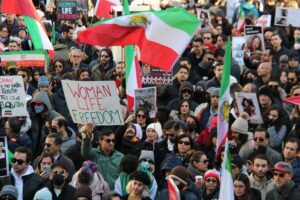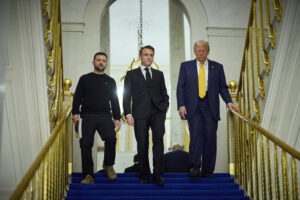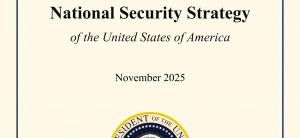Putin is on the ropes. This is as worrying as it is pleasing, since he will stop at nothing to try to regain control, but we must already think about the new relations that we could propose to post-Putin Russia.
Putin is on the ropes because he would have needed a blitzkrieg. He should have been able to enter Kiev forty-eight hours after his armies, to be acclaimed as a liberator and to receive the heartfelt thanks of the Pétain he would have pulled out of his pocket to replace the “Nazi drug addicts” from whom he would have rid Ukraine.
This man could then have claimed a success, even if it was a temporary one, but if he shouted in anger at the Ukrainian generals thirty-six hours after launching his war, if he urged them insistently to overthrow the authorities and negotiate with him, it was because every hour that passed marked his defeat.
Instead of fleeing or being assassinated by sold-out coup plotters, the head of state, Volodymyr Zelenski, was firmly at the helm of his country, determined, courageous and making the whole world ashamed to support Ukraine only in words and from a distance. This comedian turned Churchill personally embodied the resistance of his country, which did not collapse, did not panic, but faced up to and screamed at its invaders to “go screw themselves”.
This was not a liberation. It was indeed an invasion, and as the hours passed, the Europeans and Americans made their lists of sanctions heavier, finally including, in just three days, those that the Italians and Germans would allegedly never want. Not only did the Western sanctions turn out to be massive, but NATO found a reason to exist again and, with France in the lead, strengthened its forces in the member states closest to Russia.
Putin had counted on the collapse of Westerners emasculated by their decadence. He had believed what his propaganda told him, but thanks to him, NATO was resurrected while the European Union closed ranks, the image of Russian power was damaged as never before and decadence appeared where it really is: in the Kremlin.
Yes, facing his political defeat, Mr Putin still had many weapons. He had the Soviet nuclear arsenal, the threat of which he did not hesitate to brandish. Above all, he had, because we have not yet reached the apocalypse, the reinforcement of the troops engaged in this adventure, and the gradual, city after city capture of the country whose infrastructures and defences nothing could prevent him from destroying.
Militarily speaking, Vladimir Putin could still win of course, but each shell, each bullet, each destroyed building and each column of tanks rushing along the roads of Ukraine broke a little more the links between these two countries so deeply related and plunged the Russians more and more into incomprehension and shame because this war, whose rationale they cannot see, is not theirs.
If he was to win, Mr Putin could only lose. This is what is happening to him. He is losing politically and diplomatically. He is losing on his domestic stage as well as on the international stage. Above all, he is losing in what was his great ambition, that of rebuilding not the Soviet Union at all, as too many Westerners believe, but the imperial Russia, that of absolutism and that of refusing to recognise any identity of its own and, what is more, any autonomy for its peoples.
One should read Vladimir Putin, his hatred of the Bolsheviks and his conviction that they had defeated the Empire through their policy of nationalities and the constitution of their Union of Republics, which were supposed to be free to follow their own destiny and which ended up becoming so under Mikhail Gorbachev. Like many of the new reactionaries on all continents, it is the Enlightenment that Mr Putin would like to extinguish and political liberalism and freedom of conscience that he would like to cut back on.
This is what he wanted to do in Ukraine by constituting, with Belarus, the Slavic nucleus of a Russian renaissance, the first step in the refoundation of a Christianity rooted in the alliance of the cross and the sword. Mr. Putin has a coherence of thought, but this coherence is internal to him and is exactly as relevant today as the re-establishment of absolute monarchies or colonial empires, of communism or the inquisition.
The fact is that Vladimir Putin is unable to force his return to the lost days of the past because he is coming up against the political and cultural realities of this 21st century that he has neglected to enter. The fact is that he is running out of steam, that the end of a reign has opened in Moscow and that, however long and violent it may be, we all, in the European Union as in the Russian Federation, have to reflect on what our common future should be.
It will be democratic because the aspiration for freedom is common to us all, as shown by the strength of the Ukrainian people, who have the same history as Russia, and as proved by the admirable courage with which so many Russians are protesting against this war.
It will be European because the United States will then have little reason to remain on our continent, where only Mr Putin’s war has brought them back; because Russia is culturally and historically European; because it must be able to rely on the other countries of Europe to escape the pull of China; and because the two pillars of the continent, the European Union and the Russian Federation, have complementary economies in terms of both their strengths and their weaknesses.
Capital is in the West, natural resources in the East. Space is in the East, know-how is in the West. Intellectual excellence is as much in the East as in the West, and that is not all.
United in stability and cooperation, our common continent could make a decisive contribution to the political stabilisation and economic development of the southern and eastern shores of the Mediterranean, of that inland lake that is the Mare nostrum.
Together, we could assert the European continent and its borderlands, its culture and its balancing power, as a pole of influence in this century.
So, yes, of course, all this is only dreams and wild utopias for the moment, but it turns out that these dreams are shared by Ukraine and the young urban middle classes of Russia, by Georgia, Belarus, Moldavia and a large part of former Soviet Central Asia. Behind the war and the abominable drama of Ukraine, things are moving, as improbable but as obvious as the subterranean changes that were at work in Poland in the 1980s and in the subsequent democratic contagion on the greyer and seemingly unchanging side of the Berlin Wall.
Nothing will happen in a day. It will take far too long and will often be terrible. It already is, but what we read in Mr Putin’s failure is the resumption of the great march towards democracy that Russia had embarked on with its perestroika.



